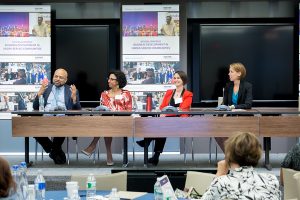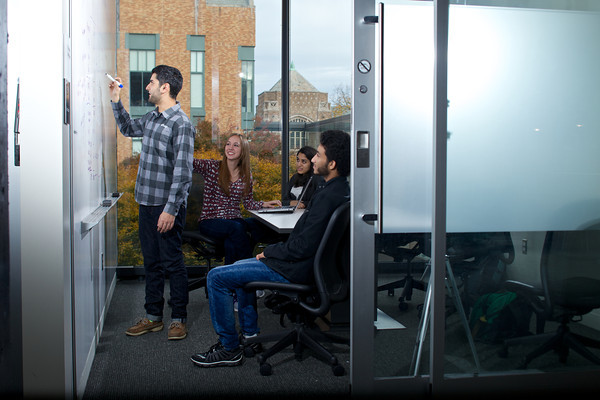A Big Bang for small business
The Foster School’s Consulting and Business Development Center has made a massive—and expanding—impact on student careers and small businesses in communities that need them most
It began with the disparate sparks of a powerful idea.
A professor dispatching student teams to help businesses in communities with high unemployment. A dean studying the challenges that minority-owned businesses face and the paths to wealth creation in communities of color deciding to invest in a solution. A pair of MBAs examining the economy’s failing of the inner city, and the failed efforts to address it.
Those students—Michael Verchot (MBA 1995) and Paul Pressley (MBA 1995)—fused the sparks into plans for a program that would offer solutions, leveraging the intellectual horsepower of the Foster School to advance businesses and grow jobs in communities where they are needed the most.
The original concept expanded upon the practicum experiments of emeritus professor Thad Spratlan, who had been deploying student consulting teams to spur growth in minority-owned small businesses, creating jobs and wealth.
Verchot and Spratlan found a champion in newly appointed dean William Bradford, whose seminal studies proved both foundation and inspiration.

William Bradford, Thad Spratlan and Michael Verchot, 20 years after the founding.
“My thought was that we are a public university,” says Bradford. “So we needed to contribute not only to the Boeings and the Microsofts, but also to small firms and those in less economically developed areas of the state.”
Bradford approved the UW Business and Economic Development Program in fall of 1995, and appointed Verchot director. The first student consulting projects debuted the year after.
“At that point,” Verchot says, “Our wildest dream was to have six or 10 student teams working with companies in inner-city Seattle to help them grow.”
In the 20 years since its creation, the idea has become the Consulting and Business Development Center. And that Center has become a powerful accelerator of student careers and catalyst of business and job growth in communities across the state—and the nation.
Expanding from the center
 Appropriately, the pro-growth Center began growing almost immediately.
Appropriately, the pro-growth Center began growing almost immediately.
Verchot endowed it with an opportunistic streak and a philosophy ripped from tech firms like Microsoft, with their iterative versions 1.0, 2.0, 3.0, ad infinitum. “That was our approach,” he says. “Speed to market and continually improve.”
The Center complemented its quickly expanding MBA consulting program with undergraduate programs. It struck longstanding partnerships with influential institutions such as Safeco, Wells Fargo and Seattle Rotary. It tapped Foster alumni and Rotary experts to mentor and advise students and business owners. It brokered professional insurance, legal and management advice for client businesses, and eventually preferred access to small business loans. It offered scholarships to enroll clients in Foster Executive Education courses and developed customized small business programs to serve minority entrepreneurs in Seattle and small businesses in Yakima and the Tri-Cities. It formed partnerships with Tribes to support job growth, launched MBAs and MPAs onto non-profit boards, and created scholarships for under-represented minority students.
The list grows on and on.
National network
The Consulting and Business Development Center’s innovations and impact do not stop at the state line, either.
It has inspired and informed a constellation of kindred centers that have arisen at business schools across the country over the past two decades.

Panelists at the 2015 National Conference on Business Development in Underserved Communities.
To better connect these far-flung efforts and accelerate their shared objective of small business-based economic growth and job creation, the Center partnered with JPMorgan Chase in 2012 to host a national conference that annually convenes business schools, financial institutions and policy makers.
More importantly, Verchot says, this growing conference is a mechanism to create a collaborative national network, with the Foster Center at the hub and an “open source” ethos throughout.
“It may not make sense for other schools to replicate our model of accelerating student careers and growing businesses and jobs,” he says. “But we’re always helping them create their own models that make perfect sense for them. And then we get to learn from their experiments as well.”
The big-picture goal is to reach the tipping point at which centers of small business development become as ubiquitous a feature of American b-schools as centers of entrepreneurship and global business are today.
Powered by Foster
If the Center thinks nationally, it continues to act locally. Its two decades of expansions and innovations have served an unwavering statewide mission with laser focus.
“The longer we do this the more I realize how right we got it at our founding,” Verchot says. “It’s about being opportunistic and iterative. Quick to market and always refining. And staying true to our mission of accelerating student careers and growing businesses and jobs in underserved communities in the state of Washington.”

Hundreds of Foster students provide consulting for area small businesses each year.
That mission has generated $100 million in new revenue and created or retained 100,000 jobs across the state. In 2015 alone, 350 Foster students and a dozen faculty worked with 100 small businesses and nonprofits, which grew their revenues by $8.9 million.
But it’s the faces behind those figures that illustrate the impact most profoundly—thousands of people whose lives, careers and fortunes have been transformed through their engagement with the UW Consulting and Business Development Center.
“The Center has become a nexus,” says longtime advisor and client Craig Dawson (BA 1985), “a place to leverage people, education and capital, and a major component of one of the best business schools in the world.”
Consulting and Business Development Center milestones
1995 – Center launched; Student Consulting begins
1997 – Employ MBAs in summer consulting internships; Alumni and Seattle Rotary members begin mentoring and advising
1999 – Scholarships awarded for Executive Education programs; sponsor the first annual Minority Business of the Year Awards
2000 – Start Board Fellows Program that places MBAs and MPAs on nonprofit boards
2001 – Begin providing business education in the Yakima Valley
2003 – Host the Minority CEO Summit and Celebration of African American Business Achievement
2004 – First endowed scholarship for Latino MBA students in the US created
2005 – Launch Tribal Enterprise Partnerships
2007 – African American Heritage MBA Scholarship created
2008 – Launch Minority Business Executive Program, drawing businesses from across the US
2009 – Asian Pacific Islander Undergraduate Endowed Scholarship created
2012 – Publish Multicultural Marketing and Business Consulting textbook
2013 – Host first National Conference on Business Development in Underserved Communities; become national research partner for the Billion Dollar Roundtable
2014 – Offer Business Certificate Program in Yakima and Tri-Cities; launch partnership with the national Minority Business Hall of Fame & Museum
2015 – Begin Business Growth Collaborative
